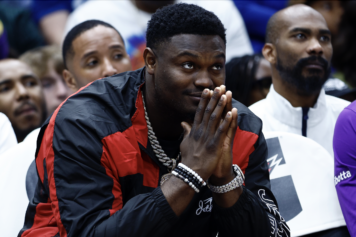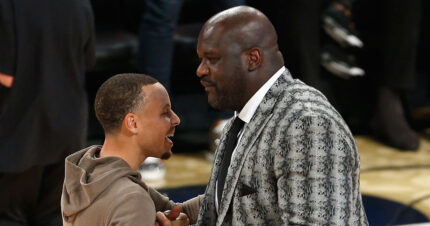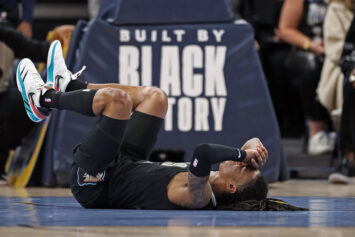Over the weekend, battle rap influencer Dagoberto Velez (most popularly known as Street Star Norbes) filed a lawsuit against the Ultimate Rap League (URL) and it’s owners, Troy Mitchell, Eric Beasley, and Jean French. The lawsuit alleges that Norbes was pushed out of the company once it engaged in their “lucrative deal” with Caffeine Inc. and Canadian rap star Aubrey “Drake” Graham.
He is suing for over $40,000,000 (including damages) and for sole ownership of the company.
The Ultimate Rap League is the premier battle rap sporting agency presenting competitive emceeing from each spectrum of the industry. From its talent finding titles “Proving Grounds,” “The Crucible” and “Ultimate Madness” to its events that have become the most coveted stages in the entire battle rap world “Born Legacy,” “Banned,” “NOME,” “Double Impact” and “Summer Madness” — the activations and artists represented by the brand have been knighted by industry vets from Sean “Puff Daddy” Combs, Method Man, Busta Rhymes, Floyd Mayweather, Rakim and more. Velez was a part of building this legacy and the courts will decide exactly in what way.
In an 80-page document, Velez walks the court through his remarkable 11-year relationship and history of the URL and claims that his image and likeness has been unlawfully used by the league. The “multicount lawsuit” says that the URL partners are in breach of contract and wrongfully dissolved his relationship to the company. He further claims, among other things, that the URL is also in “breach of fiduciary duty” and did not act in his best interest.
His argument hinges on a verbal agreement in 2009 that he would be an equal partner with Mitchell, Beasley, and French. However, the filing does not mention who he had the verbal agreement with. The document also did not show him operating as a partner, but rather a consultant, corporate executive, or as a joint venture entity. What is the difference?
As a consultant, Velez would have been hired to provide the URL company his expert advice as a battle rap professional on talent and any given area of the culture. In this capacity, he would have been hired in a variety of ways to secure talent, locations, or produce events — even participating in business decisions (but not with the authority to make decisions).
As a corporate executive, the former War Report host would have been higher in status than a manager or supervisor, helping to create long-term or big picture strategies for the URL. He would have been in charge of a specific area (division or department like the Proving Ground) with a considerable amount of autonomy to get stuff done. Still, as a corporate executive he would have to get permission or approval for the work that he wants to get done — running things by the management team or owners.
Lastly, as a joint venture, he would have engaged in a business relationship with the URL and agreed to bring his resources to complement the company. In this case, he could do business on behalf of the league and his brand (including receiving money that would add to his contribution to a project or card). According to Investopedia.com, “in a joint venture (JV), each of the participants is responsible for profits, losses, and costs associated with it. However, the venture is its own entity, separate from the participants’ other business interests.”
After reviewing this extensive document, it is clear that anyone of those titles could apply to Velez. What is absent is the many artists that he brought to the table, some in which he managed — receiving a manager’s fee each time they battled on URL or any other league.
What he did mention, repeatedly, was that he was included in high-level decision making, but also that he had to get approval (from Beasley) for contracts, venues and etc. He also shows that he received reimbursement for expenses on behalf of URL from his relationship with the professional football player, Gerald McCoy (though it does not specify what that relationship was).
At first, McCoy visited various events such as NOME, Summer Madness, and Born Legacy (2012 – 2016). However, by January 2019, he started electronically wiring Velez monies “via an electronic transfer … to cover expenses of the Ultimate Rap League.” Over a one year span, he received over $41,000 from the former Cowboy (mostly to cover Proving Ground or Born Legacy/ Banned Legacy events — events that Velez produced for the URL).
It is also important to note that within the filing, he was able to identify times on videotape in interviews where he was referred to as “partner” and attended meetings with one of the partners to Amazon and Twitch, helped secure URL talent for the Eminem produced event Total Slaughter and helped Smack and other URL talent get into a movie called Bodied by the former Detroit battle rapper turned award-winning mainstream artists.
URL severed its relationship in April of 2020, months after securing a streaming partnership with Caffeine TV. Over Q2, the newly formed streaming company raised $113 million “to invest in new forms of entertainment that users can watch and engage within real-time.” Allowing users to watch and engage is what separates Caffeine from Twitch and YouTube. Also, while a great amount of $113 million will go to marketing battle rap much over it goes to promoting other programs on the app (including anniversary celebrations from legacy artists like Mobb Deep and Eric B and Rakim and shows by new artists like Doja Cat, Offset, The Game, and Drake). The marketing for battle rap, a deal that is exclusive to the Ultimate Rap League, can be seen in an increase in publicity, social media, and large digital billboards.
Velez says over his tenure with the company he never participated in the company’s profit or revenue shares. He says that all that he has ever been offered is a monthly subscription to the URL app — which was canceled after URL “received undersigned counsel’s demand for an accounting and a proper dissolution of the partnership.” He is suing for compensatory damages of $30 million and a 10% royalty in perpetuity of all the quarterly revenue of the Ultimate Rap League, LLC, its subsidiaries, and any successors in interest. He is further asking for $10 million in punitive damages, $250 thousand in reliance damages, and sole ownership of the business under New York Partnership Law §§ 63 and 68.
Should he win, this would be the largest payout in battle rap history. URL’s only statement is found in the document: “Defendants claim that Plaintiff is owed nothing.”



